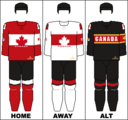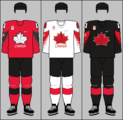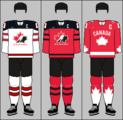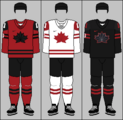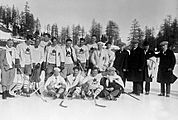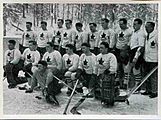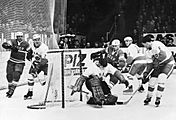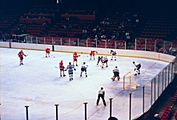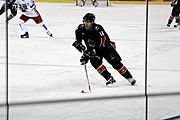Canada men's national ice hockey team facts for kids
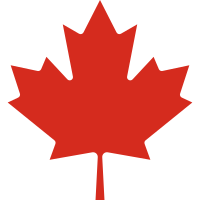 |
|
| Nickname(s) | Team Canada (Équipe Canada) |
|---|---|
| Association | Hockey Canada |
| Head coach | André Tourigny |
| Assistants | Dean Evason Steve Ott Jay Woodcroft |
| Captain | Sidney Crosby |
| Most games | Brad Schlegel (304) |
| Top scorer | Brad Schlegel |
| Most points | Cliff Ronning (156) |
| IIHF code | CAN |
| IIHF ranking | 1 |
| Highest IIHF ranking | 1 (2003–05, 2008, 2010, 2015–21, since 2023) |
| Lowest IIHF ranking | 5 (2012–13) |
| Team colours | Red, black, white |
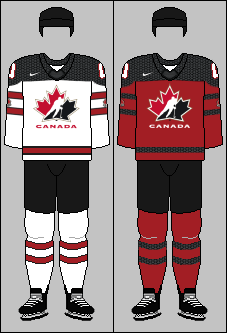 |
|
| First international | |
| Canada (Les Avants, Switzerland; January 10, 1910) |
|
| Biggest win | |
| Canada (Stockholm, Sweden; February 12, 1949) |
|
| Biggest defeat | |
| Soviet Union (Vienna, Austria; April 24, 1977) |
|
| IIHF World Championships | |
| Appearances | 77 (first in 1920) |
| Best result | |
| Canada Cup / World Cup | |
| Appearances | 8 (first in 1976) |
| Best result | |
| Olympics | |
| Appearances | 23 (first in 1920) |
| Medals | |
| International record (W–L–T) | |
| 1237–425–132 | |
| Medal record | ||
|---|---|---|
| Olympic Games | ||
| Gold | 1920 Antwerp | Team |
| Gold | 1924 Chamonix | Team |
| Gold | 1928 St. Moritz | Team |
| Gold | 1932 Lake Placid | Team |
| Gold | 1948 St. Moritz | Team |
| Gold | 1952 Oslo | Team |
| Gold | 2002 Salt Lake City | Team |
| Gold | 2010 Vancouver | Team |
| Gold | 2014 Sochi | Team |
| Silver | 1936 Garmisch-Partenkirchen | Team |
| Silver | 1960 Squaw Valley | Team |
| Silver | 1992 Albertville | Team |
| Silver | 1994 Lillehammer | Team |
| Bronze | 1956 Cortina d'Ampezzo | Team |
| Bronze | 1968 Grenoble | Team |
| Bronze | 2018 Pyeongchang | Team |
| World Championships | ||
| Gold | 1920 Belgium | Team |
| Gold | 1924 France | Team |
| Gold | 1928 Switzerland | Team |
| Gold | 1930 Austria/France/Germany | |
| Gold | 1931 Poland | |
| Gold | 1932 United States | Team |
| Gold | 1934 Italy | |
| Gold | 1935 Switzerland | |
| Gold | 1937 Great Britain | |
| Gold | 1938 Czechoslovakia | |
| Gold | 1939 Switzerland | |
| Gold | 1948 Switzerland | Team |
| Gold | 1950 Great Britain | |
| Gold | 1951 France | |
| Gold | 1952 Norway | Team |
| Gold | 1955 West Germany | |
| Gold | 1958 Norway | |
| Gold | 1959 Czechoslovakia | |
| Gold | 1961 Switzerland | |
| Gold | 1994 Italy | |
| Gold | 1997 Finland | |
| Gold | 2003 Finland | |
| Gold | 2004 Czech Republic | |
| Gold | 2007 Russia | |
| Gold | 2015 Czech Republic | |
| Gold | 2016 Russia | |
| Gold | 2021 Latvia | |
| Gold | 2023 Finland/Latvia | |
| Silver | 1933 Czechoslovakia | |
| Silver | 1936 Germany | Team |
| Silver | 1949 Sweden | |
| Silver | 1954 Sweden | |
| Silver | 1960 United States | Team |
| Silver | 1962 United States | |
| Silver | 1985 Czechoslovakia | |
| Silver | 1989 Sweden | |
| Silver | 1991 Finland | |
| Silver | 1996 Austria | |
| Silver | 2005 Austria | |
| Silver | 2008 Canada | |
| Silver | 2009 Switzerland | |
| Silver | 2017 Germany/France | |
| Silver | 2019 Slovakia | |
| Silver | 2022 Finland | |
| Bronze | 1956 Italy | Team |
| Bronze | 1966 Yugoslavia | |
| Bronze | 1967 Austria | |
| Bronze | 1968 France | Team |
| Bronze | 1978 Czechoslovakia | |
| Bronze | 1982 Finland | |
| Bronze | 1983 West Germany | |
| Bronze | 1986 Soviet Union | |
| Bronze | 1995 Sweden | |
| Canada Cup / World Cup | ||
| Gold | 1976 Montreal | |
| Gold | 1984 Edmonton | |
| Gold | 1987 Hamilton | |
| Gold | 1991 Hamilton | |
| Gold | 2004 Toronto | |
| Gold | 2016 Toronto | |
| Silver | 1981 Montreal | |
| Silver | 1996 Montreal | |
| Winter Universiade | ||
| Gold | 1981 Jaca | Team |
| Gold | 1991 Sapporo | Team |
| Gold | 2007 Turin | Team |
| Gold | 2013 Trentino | Team |
| Gold | 2023 Lake Placid | Team |
| Silver | 1972 Lake Placid | Team |
| Silver | 2001 Zakopane | Team |
| Silver | 2009 Harbin | Team |
| Bronze | 1968 Innsbruck | Team |
| Bronze | 1987 Štrbské Pleso | Team |
| Bronze | 1997 Muju-Jeonju | Team |
| Bronze | 1999 Poprad-Tatry | Team |
| Bronze | 2003 Tarvisio | Team |
| Bronze | 2011 Erzurum | Team |
| Bronze | 2015 Granada-Štrbské Pleso | Team |
| Bronze | 2017 Almaty | Team |
| Bronze | 2019 Krasnoyarsk | Team |
The Canada men's national ice hockey team (popularly known as Team Canada; French: Équipe Canada) is the ice hockey team representing Canada internationally. The team is overseen by Hockey Canada, a member of the International Ice Hockey Federation. From 1920 until 1963, Canada's international representation was by senior amateur club teams. Canada's national men's team was founded in 1963 by Father David Bauer as a part of the Canadian Amateur Hockey Association, playing out of the University of British Columbia. The nickname "Team Canada" was first used for the 1972 Summit Series and has been frequently used to refer to both the Canadian national men's and women's teams ever since.
Canada is the leading national ice hockey team in international play, having won the 1972 Summit Series against the Soviet Union, a record four Canada Cups dating back to 1976, a record two World Cups of Hockey, a record nine Olympic gold medals, and a record 28 World Championship titles.
Canada is one of the most successful national ice hockey teams in the world and a member of the so-called "Big Six", the unofficial group of the six strongest men's ice hockey nations, along with Russia, the United States, Sweden, Finland, and the Czech Republic.
Contents
History
Hockey is Canada's national winter sport, and Canadians are extremely passionate about the game. Canada was first represented internationally at the 1910 European Championships by the Oxford Canadians, a team of Canadians from the University of Oxford. They represented Canada again at the 1912 World Championships.
From 1920 until 1963, the senior amateur club teams representing Canada, were usually the most recent Allan Cup champions. The last amateur club team from Canada to win a gold medal at the World Championship was the Trail Smoke Eaters in 1961. The responsibility of choosing which team represented Canada belonged to Canadian Amateur Hockey Association (CAHA) secretary-manager; George Dudley from 1947 to 1960, and Gordon Juckes from 1960 to 1963.
Following the 1963 World Championships, Father David Bauer founded the national team as a permanent institution. The new permanent national team first competed in ice hockey at the 1964 Winter Olympics. His philosophy was to simply win the games against the weaker countries instead of running up the score. Canada, Czechoslovakia and Sweden finished with identical records of five wins and two losses. Canada thought they had won the bronze medal based on the goal differential in the three games among the tied countries. When they attended the presentation of the Olympic medals, they were disappointed to learn they had finished in fourth place based on goal differential of all seven games played. The players and CAHA president Art Potter accused that International Ice Hockey Federation (IIHF) president Bunny Ahearne, made a last-minute decision to change the rules and take away a medal from Canada. Marshall Johnston summarized the team's feeling that, "The shepherd and his flock had been fleeced".
Before the Soviet Union began international competition in 1954, Canada dominated international hockey, winning six out of seven golds at the Olympics and 10 World Championship gold medals. Canada then went 50 years without winning the Winter Olympic Gold medal, and from 1962 to 1993, did not win any World Championships. This was in part because Canada's best professional players were unable to attend these events as they had commitments with their National Hockey League teams.
Canada was awarded hosting duties of the 1970 Ice Hockey World Championships with the limited use of former professionals. The IIHF later reversed the permission after International Olympic Committee president Avery Brundage objected to professionals at an amateur event. CAHA president Earl Dawson withdrew the national team from international competitions against European hockey teams until Canada was allowed to use its best players.
While boycotting the IIHF, other international competitions were held such as the 1972 Canada–USSR Summit Series and in 1976 the inaugural Canada Cup invitational. Canada returned to the IIHF in 1977 after a series of negotiations between IIHF President Günther Sabetzki and top Canadian and American professional ice hockey officials. As a result, professionals are allowed to compete at the World Championship which was scheduled later in the year to ensure more players are available from among the NHL teams eliminated from the Stanley Cup playoffs. In return, a competition for the Canada Cup was to be played every four years on North American territory with the participation of Canada, the United States, and the four strongest European national teams, including professionals.
In 1983, Hockey Canada began the "Program of Excellence", whose purpose was to prepare a team for the Winter Olympics every four years. This new National Team played a full season together all over the world against both national and club teams, and often attracted top NHL prospects. In 1986, the International Olympic Committee voted to allow professional athletes to compete in Olympic Games, starting in 1988. Veteran pros with NHL experience and, in a few cases, current NHLers who were holding out in contract disputes joined the team. This program was discontinued in 1998, when the NHL began shutting down to allow its players to compete.
After not winning a gold medal for 33 years, Canada won the 1994 World Championship in Italy. Since that time, they have won in 1997, 2003, 2004, 2007, 2015, 2016, 2021 and 2023. Canada captured its first Olympic gold medal in 50 years at Salt Lake City 2002. At Vancouver 2010, Canada won the gold medal with a 3–2 win against the United States in the final. Sidney Crosby's overtime goal secured Canada the final gold medal awarded at the Games. At the 2012 World Championship in Finland and Sweden, Ryan Murray became the first draft eligible prospect to represent Canada at the Ice Hockey World Championship.
Canada successfully defended gold at Sochi 2014, becoming the first men's team to do so since the Soviet Union in 1988, the first to finish the tournament undefeated since 1984 and the first to do both with a full NHL participation. Their relentless offensive pressure and stifling defence has earned the 2014 squad praise as perhaps the best, most complete Team Canada ever assembled. Drew Doughty and Shea Weber led the team in scoring, while Jonathan Toews scored the gold medal-winning goal in the first period of a 3–0 win over Sweden in the final. The architect behind the 2010 and 2014 teams, Steve Yzerman, immediately stepped down as general manager following the win.
Led by general manager Jim Nill, head coach Todd McLellan, and the late addition of captain Sidney Crosby, Canada won the 2015 IIHF World Championship in dominating fashion over Russia, their first win at the Worlds since 2007. By winning all 10 of their games in regulation, Hockey Canada was awarded a 1 million Swiss franc bonus prize in the first year of its existence. Canada scored 66 goals in their 10 games and had the top three scorers of the tournament: Jason Spezza, Jordan Eberle and Taylor Hall. Tyler Seguin also led the championship with nine goals. The win secured Canada's return to number one on the IIHF world rankings for the first time since 2010.
At the 2021 IIHF World Championship, following a cancelled 2020 tournament due to the COVID-19 pandemic, Canada returned to the competition with a roster weaker than most years, featuring rare inclusions of draft prospects and other non-NHL prospects. The team lost three games in regulation to start the tournament, the first Canadian team in Worlds history to do so, and needed 10 points over the final four round robin games to make the playoff round. Winning the tiebreaker over Kazakhstan, Canada qualified for the playoff round as the lowest seed and managed wins over Russia and the United States before playing Finland for a rematch of the 2019 final in the gold medal game. Nick Paul's goal won the game for Canada in overtime, despite the Finns having either led or been tied the entire game, capping off a most unlikely Canadian IIHF men's gold.
List of teams representing Canada from 1920 to 1963
| Event | Team | Hometown |
|---|---|---|
| 1920 Summer Olympics | Winnipeg Falcons | Winnipeg, Manitoba |
| 1924 Winter Olympics | Toronto Granites | Toronto, Ontario |
| 1928 Winter Olympics | University of Toronto | Toronto, Ontario |
| 1930 World Championships | Toronto CCMs | Toronto, Ontario |
| 1931 World Championships | University of Manitoba | Winnipeg, Manitoba |
| 1932 Winter Olympics | Winnipeg Hockey Club | Winnipeg, Manitoba |
| 1933 World Championships | Toronto National Sea Fleas | Toronto, Ontario |
| 1934 World Championships | Saskatoon Quakers | Saskatoon, Saskatchewan |
| 1935 World Championships | Winnipeg Monarchs | Winnipeg, Manitoba |
| 1936 Winter Olympics | Port Arthur Bearcats | Port Arthur, Ontario |
| 1937 World Championships | Kimberley Dynamiters | Kimberley, British Columbia |
| 1938 World Championships | Sudbury Wolves | Sudbury, Ontario |
| 1939 World Championships | Trail Smoke Eaters | Trail, British Columbia |
| World Championships not held from 1940 to 1946 due to World War II. | ||
| 1947 World Championships | did not participate | |
| 1948 Winter Olympics | Ottawa RCAF Flyers | CFB Ottawa, Ontario |
| 1949 World Championships | Sudbury Wolves | Sudbury, Ontario |
| 1950 World Championships | Edmonton Mercurys | Edmonton, Alberta |
| 1951 World Championships | Lethbridge Maple Leafs | Lethbridge, Alberta |
| 1952 Winter Olympics | Edmonton Mercurys | Edmonton, Alberta |
| 1953 World Championships | did not participate | |
| 1954 World Championships | East York Lyndhursts | East York, Ontario |
| 1955 World Championships | Penticton Vees | Penticton, British Columbia |
| 1956 Winter Olympics | Kitchener-Waterloo Dutchmen | Kitchener–Waterloo, Ontario |
| 1957 World Championships | did not participate | |
| 1958 World Championships | Whitby Dunlops | Whitby, Ontario |
| 1959 World Championships | Belleville McFarlands | Belleville, Ontario |
| 1960 Winter Olympics | Kitchener-Waterloo Dutchmen | Kitchener–Waterloo, Ontario |
| 1961 World Championships | Trail Smoke Eaters | Trail, British Columbia |
| 1962 World Championships | Galt Terriers | Galt, Ontario |
| 1963 World Championships | Trail Smoke Eaters | Trail, British Columbia |
Competition achievements
Olympic Games
All Olympic ice hockey tournaments between 1920 and 1968 also counted as World Championships.
| Games | Representative | GP | W | L | T | GF | GA | Coach | Manager/GM | Captain | Finish | Ref. |
|---|---|---|---|---|---|---|---|---|---|---|---|---|
| 1920 Antwerp | Winnipeg Falcons | 3 | 3 | 0 | 0 | 21 | 1 | Gordon Sigurjonsson | H. A. Axford | Frank Fredrickson | ||
| 1924 Chamonix | Toronto Granites | 5 | 5 | 0 | 0 | 110 | 3 | Frank Rankin | William Hewitt | Dunc Munro | ||
| 1928 St. Moritz | University of Toronto Grads | 3 | 3 | 0 | 0 | 38 | 0 | Conn Smythe | William Hewitt | John Porter | ||
| 1932 Lake Placid | Winnipeg Hockey Club | 6 | 5 | 0 | 1 | 32 | 4 | Jack Hughes | Lou Marsh | William Cockburn | ||
| 1936 Garmisch- Partenkirchen |
Port Arthur Bearcats | 8 | 7 | 1 | 0 | 54 | 7 | Al Pudas | Malcolm Cochrane | Herman Murray | ||
| 1948 St. Moritz | Ottawa RCAF Flyers | 8 | 7 | 0 | 1 | 69 | 5 | Frank Boucher | Sandy Watson | George Mara | ||
| 1952 Oslo | Edmonton Mercurys | 8 | 7 | 0 | 1 | 71 | 14 | Lou Holmes | Jim Christianson | Billy Dawe | ||
| 1956 Cortina d'Ampezzo | Kitchener-Waterloo Dutchmen | 8 | 6 | 2 | 0 | 53 | 12 | Bobby Bauer | Ernie Goman | Jack McKenzie | ||
| 1960 Squaw Valley | Kitchener-Waterloo Dutchmen | 7 | 6 | 1 | 0 | 55 | 15 | Bobby Bauer | Ernie Goman | Harry Sinden | ||
| 1964 Innsbruck | National team program | 7 | 5 | 2 | 0 | 32 | 17 | David Bauer | Bob Hindmarch | Hank Akervall | 4th | |
| 1968 Grenoble | National team program | 7 | 5 | 2 | 0 | 28 | 15 | Jackie McLeod | David Bauer | Marshall Johnston | ||
| 1972 Sapporo | did not participate | |||||||||||
| 1976 Innsbruck | ||||||||||||
| 1980 Lake Placid | National team program | 6 | 3 | 3 | 0 | 29 | 18 | Clare Drake | Rick Noonan | Randy Gregg | 6th | |
| 1984 Sarajevo | National team program | 7 | 4 | 3 | 0 | 24 | 16 | Dave King | Dave King | Dave Tippett | 4th | |
| 1988 Calgary | National team program | 8 | 5 | 2 | 1 | 31 | 21 | Dave King | Dave King | Trent Yawney | 4th | |
| 1992 Albertville | National team program | 8 | 6 | 2 | 0 | 37 | 17 | Dave King | Dave King | Brad Schlegel | ||
| 1994 Lillehammer | National team program | 8 | 5 | 2 | 1 | 27 | 19 | Tom Renney | George Kingston | Fabian Joseph | ||
| 1998 Nagano | 6 | 4 | 2 | 0 | 19 | 8 | Marc Crawford | Bobby Clarke | Eric Lindros | 4th | ||
| 2002 Salt Lake City | 6 | 4 | 1 | 1 | 22 | 14 | Pat Quinn | Wayne Gretzky | Mario Lemieux | |||
| 2006 Turin | 6 | 3 | 3 | 0 | 15 | 11 | Pat Quinn | Wayne Gretzky | Joe Sakic | 7th | ||
| 2010 Vancouver | 7 | 6 | 1 | — | 32 | 14 | Mike Babcock | Steve Yzerman | Scott Niedermayer | |||
| 2014 Sochi | 6 | 6 | 0 | — | 17 | 3 | Mike Babcock | Steve Yzerman | Sidney Crosby | |||
| 2018 Pyeongchang | National team program | 6 | 4 | 2 | — | 21 | 12 | Willie Desjardins | Sean Burke | Chris Kelly | ||
| 2022 Beijing | National team program | 5 | 3 | 2 | — | 19 | 9 | Claude Julien | Shane Doan | Eric Staal | 6th | |
| 2026 Milan and Cortina | qualified | |||||||||||
World Championships
All Olympic ice hockey tournaments between 1920 and 1968 also counted as World Championships. World Championships were not held from 1940 to 1946 during World War II and during the Winter Olympic years of 1980, 1984 or 1988. The 2020 tournament was cancelled due to the COVID-19 pandemic.
| Year | Location | Result |
|---|---|---|
| 1920 | Antwerp, Belgium | Gold |
| 1924 | Chamonix, France | Gold |
| 1928 | St. Moritz, Switzerland | Gold |
| 1930 | Chamonix, France / Berlin, Germany / Vienna, Austria | Gold |
| 1931 | Krynica, Poland | Gold |
| 1932 | Lake Placid, New York, United States | Gold |
| 1933 | Prague, Czechoslovakia | Silver |
| 1934 | Milan, Italy | Gold |
| 1935 | Davos, Switzerland | Gold |
| 1936 | Garmisch-Partenkirchen, Germany | Silver |
| 1937 | London, United Kingdom | Gold |
| 1938 | Prague, Czechoslovakia | Gold |
| 1939 | Zürich / Basel, Switzerland | Gold |
| World Championships not held from 1940 to 1946 due to World War II. | ||
| Canada did not participate in 1947. | ||
| 1948 | St. Moritz, Switzerland | Gold |
| 1949 | Stockholm, Sweden | Silver |
| 1950 | London, United Kingdom | Gold |
| 1951 | Paris, France | Gold |
| 1952 | Oslo, Norway | Gold |
| Canada did not participate in 1953. | ||
| 1954 | Stockholm, Sweden | Silver |
| 1955 | Krefeld / Dortmund / Cologne, West Germany | Gold |
| 1956 | Cortina d'Ampezzo, Italy | Bronze |
| Canada did not participate in 1957. | ||
| 1958 | Oslo, Norway | Gold |
| 1959 | Prague / Bratislava, Czechoslovakia | Gold |
| 1960 | Squaw Valley, California, United States | Silver |
| 1961 | Geneva / Lausanne, Switzerland | Gold |
| 1962 | Colorado Springs / Denver, Colorado, United States | Silver |
| 1963 | Stockholm, Sweden | 4th place |
| 1964 | Innsbruck, Austria | 4th place |
| 1965 | Tampere, Finland | 4th place |
| 1966 | Ljubljana, Yugoslavia | Bronze |
| 1967 | Vienna, Austria | Bronze |
| 1968 | Grenoble, France | Bronze |
| 1969 | Stockholm, Sweden | 4th place |
| Canada did not participate in IIHF events from 1970 to 1976. | ||
| 1977 | Vienna, Austria | 4th place |
| 1978 | Prague, Czechoslovakia | Bronze |
| 1979 | Moscow, Russian SFSR, Soviet Union | 4th place |
| 1981 | Gothenburg / Stockholm, Sweden | 4th place |
| 1982 | Helsinki / Tampere, Finland | Bronze |
| 1983 | Düsseldorf / Dortmund / Munich, West Germany | Bronze |
| 1985 | Prague, Czechoslovakia | Silver |
| 1986 | Moscow, Russian SFSR, Soviet Union | Bronze |
| 1987 | Vienna, Austria | 4th place |
| 1989 | Stockholm / Södertälje, Sweden | Silver |
| 1990 | Bern / Fribourg, Switzerland | 4th place |
| 1991 | Turku / Helsinki / Tampere, Finland | Silver |
| 1992 | Prague / Bratislava, Czechoslovakia | 8th place |
| 1993 | Dortmund / Munich, Germany | 4th place |
| 1994 | Bolzano / Canazei / Milan, Italy | Gold |
| 1995 | Stockholm / Gävle, Sweden | Bronze |
| 1996 | Vienna, Austria | Silver |
| 1997 | Helsinki / Turku / Tampere, Finland | Gold |
| 1998 | Zürich / Basel, Switzerland | 6th place |
| 1999 | Oslo / Lillehammer / Hamar, Norway | 4th place |
| 2000 | Saint Petersburg, Russia | 4th place |
| 2001 | Cologne / Hanover / Nuremberg, Germany | 5th place |
| 2002 | Gothenburg / Karlstad / Jönköping, Sweden | 6th place |
| 2003 | Helsinki / Tampere / Turku, Finland | Gold |
| 2004 | Prague / Ostrava, Czech Republic | Gold |
| 2005 | Innsbruck / Vienna, Austria | Silver |
| 2006 | Riga, Latvia | 4th place |
| 2007 | Moscow / Mytishchi, Russia | Gold |
| 2008 | Quebec City / Halifax, Quebec, Canada | Silver |
| 2009 | Bern / Kloten, Switzerland | Silver |
| 2010 | Cologne / Mannheim / Gelsenkirchen, Germany | 7th place |
| 2011 | Bratislava / Košice, Slovakia | 5th place |
| 2012 | Helsinki, Finland / Stockholm, Sweden | 5th place |
| 2013 | Stockholm, Sweden / Helsinki, Finland | 5th place |
| 2014 | Minsk, Belarus | 5th place |
| 2015 | Prague / Ostrava, Czech Republic | Gold |
| 2016 | Moscow / Saint Petersburg, Russia | Gold |
| 2017 | Cologne, Germany / Paris, France | Silver |
| 2018 | Copenhagen / Herning, Denmark | 4th place |
| 2019 | Bratislava / Košice, Slovakia | Silver |
| 2021 | Riga, Latvia | Gold |
| 2022 | Tampere / Helsinki, Finland | Silver |
| 2023 | Tampere, Finland / Riga, Latvia | Gold |
| 2024 | Prague / Ostrava, Czech Republic | 4th place |
Canada Cup / World Cup of Hockey
- 1976 – Champions
- 1981 – Runners-up
- 1984 – Champions
- 1987 – Champions
- 1991 – Champions
- 1996 – Runners-up
- 2004 – Champions
- 2016 – Champions
NHL 4 Nations Face-Off
- 2025 – Winners
Summit Series
- 1972 – Winners
- 1974 – Runners-up
On the 40th anniversary of the 1972 Summit Series, the IIHF Milestone Award was given to the Canadian and Russian teams for the event which had a "decisive influence on the development of the game". Reuters wrote that Canada was expected to win the series easily, but when they came from behind to win in the eighth and final game, it marked "the beginning of the modern hockey era".
Spengler Cup
In the Spengler Cup, Team Canada competes against European club teams, such as HC Davos who host the tournament every year in Eisstadion Davos. Canada used to be represented by the standing national team at this event, but is now usually made up of Canadians playing in European leagues or the American Hockey League. In 2019, Team Canada won its 16th Spengler Cup, passing the host team HC Davos for the most titles. HC Davos is now tied for most wins after winning in 2023.
| Results | Years |
|---|---|
| Winners | 1984, 1986, 1987, 1992, 1995, 1996, 1997, 1998, 2002, 2003, 2007, 2012, 2015, 2016, 2017, 2019 |
| Runners-up | 1985, 1988, 1990, 2000, 2001, 2005, 2006, 2008, 2010, 2018 |
| Third place | 1989, 1991, 1994, 1999, 2004, 2009 |
Team
Current roster
Roster for the 2024 IIHF World Championship.
Head coach: André Tourigny
| No. | Pos. | Name | Height | Weight | Birthdate | Team |
|---|---|---|---|---|---|---|
| 3 | D | Olen Zellweger | 1.75 m (5 ft 9 in) | 83 kg (182 lb) | September 10, 2003 | |
| 4 | D | Bowen Byram | 1.85 m (6 ft 1 in) | 86 kg (190 lb) | June 13, 2001 | |
| 8 | F | Michael Bunting | 1.83 m (6 ft 0 in) | 87 kg (192 lb) | September 17, 1995 | |
| 13 | F | Brandon Tanev | 1.83 m (6 ft 0 in) | 86 kg (189 lb) | December 31, 1991 | |
| 14 | F | Dylan Guenther | 1.88 m (6 ft 2 in) | 79 kg (175 lb) | April 10, 2003 | |
| 17 | F | Jack McBain | 1.91 m (6 ft 3 in) | 91 kg (201 lb) | January 6, 2000 | |
| 18 | F | Dawson Mercer | 1.83 m (6 ft 0 in) | 82 kg (180 lb) | October 27, 2001 | |
| 19 | F | Jared McCann | 1.85 m (6 ft 1 in) | 87 kg (191 lb) | May 31, 1996 | |
| 20 | F | Nick Paul | 1.91 m (6 ft 3 in) | 102 kg (225 lb) | March 20, 1995 | |
| 21 | D | Kaiden Guhle | 1.91 m (6 ft 3 in) | 91 kg (201 lb) | January 18, 2002 | |
| 22 | F | Dylan Cozens | 1.91 m (6 ft 3 in) | 88 kg (195 lb) | February 9, 2001 | |
| 24 | D | Jamie Oleksiak | 2.01 m (6 ft 7 in) | 117 kg (257 lb) | December 21, 1992 | |
| 25 | D | Owen Power | 1.98 m (6 ft 6 in) | 100 kg (221 lb) | November 22, 2002 | |
| 30 | G | Joel Hofer | 1.96 m (6 ft 5 in) | 81 kg (179 lb) | July 30, 2000 | |
| 35 | G | Nico Daws | 1.93 m (6 ft 4 in) | 93 kg (205 lb) | December 22, 2000 | |
| 38 | F | Brandon Hagel | 1.80 m (5 ft 11 in) | 79 kg (174 lb) | August 27, 1998 | |
| 50 | G | Jordan Binnington | 1.88 m (6 ft 2 in) | 78 kg (172 lb) | July 11, 1993 | |
| 55 | D | Colton Parayko – A | 1.98 m (6 ft 6 in) | 103 kg (228 lb) | May 12, 1993 | |
| 71 | F | Ridly Greig | 1.83 m (6 ft 0 in) | 83 kg (184 lb) | August 8, 2002 | |
| 78 | D | Damon Severson – A | 1.88 m (6 ft 2 in) | 92 kg (202 lb) | August 7, 1994 | |
| 80 | F | Pierre-Luc Dubois | 1.88 m (6 ft 2 in) | 93 kg (205 lb) | June 24, 1998 | |
| 88 | F | Andrew Mangiapane – A | 1.78 m (5 ft 10 in) | 83 kg (184 lb) | April 4, 1996 | |
| 91 | F | John Tavares – C | 1.85 m (6 ft 1 in) | 96 kg (211 lb) | September 20, 1990 | |
| 98 | F | Connor Bedard | 1.78 m (5 ft 10 in) | 84 kg (185 lb) | July 17, 2005 |
Select team roster
Roster for the 2025 4 Nations Face-Off
Head coach: Jon Cooper
| No. | Pos. | Name | Height | Weight | Birthdate | Team |
|---|---|---|---|---|---|---|
| 5 | D | Devon Toews | 1.85 m (6 ft 1 in) | 87 kg (191 lb) | April 21, 1994 | |
| 6 | D | Travis Sanheim | 1.93 m (6 ft 4 in) | 101 kg (222 lb) | March 29, 1996 | |
| 8 | D | Cale Makar – A | 1.83 m (6 ft 0 in) | 85 kg (187 lb) | October 30, 1998 | |
| 9 | F | Sam Bennett | 1.85 m (6 ft 1 in) | 88 kg (193 lb) | June 20, 1996 | |
| 11 | F | Travis Konecny | 1.78 m (5 ft 10 in) | 87 kg (192 lb) | March 11, 1997 | |
| 13 | F | Sam Reinhart | 1.85 m (6 ft 1 in) | 89 kg (196 lb) | November 6, 1995 | |
| 16 | F | Mitch Marner | 1.83 m (6 ft 0 in) | 82 kg (180 lb) | May 5, 1997 | |
| 21 | F | Brayden Point | 1.80 m (5 ft 11 in) | 79 kg (175 lb) | March 13, 1996 | |
| 24 | F | Seth Jarvis | 1.78 m (5 ft 10 in) | 83 kg (184 lb) | February 1, 2002 | |
| 27 | D | Shea Theodore | 1.88 m (6 ft 2 in) | 89 kg (197 lb) | August 3, 1995 | |
| 29 | F | Nathan MacKinnon | 1.83 m (6 ft 0 in) | 91 kg (200 lb) | May 1, 1995 | |
| 33 | G | Adin Hill | 1.93 m (6 ft 4 in) | 98 kg (215 lb) | May 11, 1996 | |
| 35 | G | Sam Montembeault | 1.91 m (6 ft 3 in) | 99 kg (218 lb) | October 30, 1996 | |
| 38 | F | Brandon Hagel | 1.88 m (6 ft 2 in) | 82 kg (180 lb) | August 27, 1998 | |
| 44 | D | Josh Morrissey | 1.83 m (6 ft 0 in) | 88 kg (195 lb) | March 28, 1995 | |
| 48 | D | Thomas Harley | 1.91 m (6 ft 3 in) | 96 kg (211 lb) | August 19, 2001 | |
| 50 | G | Jordan Binnington | 1.88 m (6 ft 2 in) | 78 kg (172 lb) | July 11, 1993 | |
| 55 | D | Colton Parayko | 1.98 m (6 ft 6 in) | 103 kg (228 lb) | May 12, 1993 | |
| 61 | F | Mark Stone | 1.91 m (6 ft 3 in) | 95 kg (210 lb) | May 13, 1992 | |
| 63 | F | Brad Marchand – A | 1.75 m (5 ft 9 in) | 82 kg (180 lb) | May 11, 1988 | |
| 71 | F | Anthony Cirelli | 1.85 m (6 ft 1 in) | 87 kg (191 lb) | July 15, 1997 | |
| 87 | F | Sidney Crosby – C | 1.80 m (5 ft 11 in) | 91 kg (200 lb) | August 7, 1987 | |
| 89 | D | Drew Doughty | 1.85 m (6 ft 1 in) | 95 kg (210 lb) | December 8, 1989 | |
| 97 | F | Connor McDavid – A | 1.85 m (6 ft 1 in) | 88 kg (194 lb) | January 13, 1997 |
Roster for the 2024 Spengler Cup.
Head coach: Gerard Gallant
| No. | Pos. | Name | Height | Weight | Birthdate | Team |
|---|---|---|---|---|---|---|
| 1 | G | Dylan Ferguson | 1.88 m (6 ft 2 in) | 88 kg (195 lb) | September 20, 1998 | |
| 2 | D | Thomas Grégoire | 1.80 m (5 ft 11 in) | 77 kg (170 lb) | July 15, 1998 | |
| 5 | D | Layton Ahac | 1.88 m (6 ft 2 in) | 93 kg (205 lb) | February 22, 2001 | |
| 6 | D | Kodie Curran | 1.88 m (6 ft 2 in) | 91 kg (200 lb) | December 18, 1989 | |
| 7 | F | Daniel Carr | 1.83 m (6 ft 0 in) | 87 kg (191 lb) | November 1, 1991 | |
| 8 | F | Philip-Michaël Devos | 1.83 m (6 ft 0 in) | 82 kg (180 lb) | April 26, 1990 | |
| 10 | F | Tanner Fritz | 1.80 m (5 ft 11 in) | 87 kg (192 lb) | August 20, 1991 | |
| 11 | F | Logan Shaw | 1.93 m (6 ft 4 in) | 96 kg (211 lb) | October 5, 1992 | |
| 12 | D | Noel Hoefenmayer | 1.85 m (6 ft 1 in) | 93 kg (204 lb) | January 6, 1999 | |
| 13 | F | Manix Landry | 1.80 m (5 ft 11 in) | 81 kg (178 lb) | November 23, 2002 | |
| 16 | F | Curtis McKenzie | 1.88 m (6 ft 2 in) | 93 kg (205 lb) | February 22, 1991 | |
| 19 | F | Joe Carroll | 1.88 m (6 ft 2 in) | 92 kg (203 lb) | February 1, 2001 | |
| 22 | D | Colton White | 1.85 m (6 ft 1 in) | 85 kg (187 lb) | May 3, 1997 | |
| 24 | D | Madison Bowey | 1.88 m (6 ft 2 in) | 92 kg (203 lb) | April 22, 1995 | |
| 33 | G | Colten Ellis | 1.85 m (6 ft 1 in) | 84 kg (185 lb) | October 5, 2000 | |
| 35 | G | Antoine Bibeau | 1.91 m (6 ft 3 in) | 98 kg (215 lb) | May 1, 1994 | |
| 44 | F | Jonathan Hazen | 1.83 m (6 ft 0 in) | 85 kg (187 lb) | June 18, 1990 | |
| 48 | D | Jonathan Aspirot | 1.83 m (6 ft 0 in) | 93 kg (205 lb) | May 16, 1999 | |
| 52 | D | Matt Irwin | 1.88 m (6 ft 2 in) | 86 kg (190 lb) | November 29, 1987 | Unattached |
| 54 | F | Charles Hudon | 1.78 m (5 ft 10 in) | 86 kg (190 lb) | June 23, 1994 | |
| 61 | F | Phillippe Maillet | 1.75 m (5 ft 9 in) | 84 kg (185 lb) | November 7, 1992 | |
| 62 | F | Brett Seney | 1.75 m (5 ft 9 in) | 76 kg (167 lb) | February 28, 1996 | |
| 70 | F | Brandon Coe | 1.93 m (6 ft 4 in) | 85 kg (187 lb) | December 1, 2001 | |
| 81 | D | Mac Hollowell | 1.75 m (5 ft 9 in) | 85 kg (187 lb) | September 26, 1998 | |
| 86 | F | Josh Jooris | 1.85 m (6 ft 1 in) | 90 kg (198 lb) | July 14, 1990 | |
| 89 | F | Sam Gagner – C | 1.80 m (5 ft 11 in) | 89 kg (196 lb) | August 10, 1989 | Unattached |
Coaches
List of coaches of the Canada men's national ice hockey team.
- Olympics
- Gordon Sigurjonsson, 1920
- Frank Rankin, 1924
- Conn Smythe, 1928
- Jack Hughes, 1932
- Al Pudas, 1936
- Sgt. Frank Boucher, 1948
- Louis Holmes, 1952
- Bobby Bauer, 1956, 1960
- Father David Bauer, 1964
- Jackie McLeod, 1968
- Clare Drake, 1980
- Dave King, 1984, 1988, 1992
- Tom Renney, 1994
- Marc Crawford, 1998
- Pat Quinn, 2002, 2006
- Mike Babcock, 2010, 2014
- Willie Desjardins, 2018
- Claude Julien, 2022
- Summit Series, Canada Cup, World Cup, 4 Nations Face-off
- Harry Sinden, 1972 Summit Series
- Bill Harris, 1974 Summit Series
- Scotty Bowman, 1976, 1981 Canada Cups
- Glen Sather, 1984 Canada Cup, 1996 World Cup
- Mike Keenan, 1987, 1991 Canada Cups
- Pat Quinn, 2004 World Cup
- Mike Babcock, 2016 World Cup
- Jon Cooper, 2025 4 Nations Face-Off
- World Championships
- Les Allen, 1930
- Blake Wilson, 1931
- Harold Ballard, 1933
- Johnny Walker, 1934
- Scotty Oliver, 1935
- John Achtzener, 1937
- Max Silverman, 1938, 1949
- Elmer Piper, 1939
- Jimmy Graham, 1950
- Dick Gray, 1951
- Greg Currie, 1954
- Grant Warwick, 1955
- Sid Smith, 1958
- Ike Hildebrand, 1959
- Bobby Kromm, 1961, 1963
- Lloyd Roubell, 1962
- Gord Simpson, 1965
- Jackie McLeod, 1966, 1967, 1969
- Johnny Wilson, 1977
- Harry Howell, 1978
- Marshall Johnston, 1979
- Don Cherry, 1981
- Red Berenson, 1982
- Dave King, 1983, 1987, 1989, 1990, 1991, 1992
- Doug Carpenter, 1985
- Pat Quinn, 1986
- Mike Keenan, 1993
- George Kingston, 1994
- Tom Renney, 1995, 1996, 2000
- Andy Murray, 1997, 1998, 2003, 2007
- Mike Johnston, 1999
- Wayne Fleming, 2001, 2002
- Mike Babcock, 2004
- Marc Habscheid, 2005, 2006
- Ken Hitchcock, 2008, 2011
- Lindy Ruff, 2009, 2013
- Craig MacTavish, 2010
- Brent Sutter, 2012
- Dave Tippett, 2014
- Todd McLellan, 2015
- Bill Peters, 2016, 2018
- Jon Cooper, 2017
- Alain Vigneault, 2019
- Gerard Gallant, 2021
- Claude Julien, 2022
- André Tourigny, 2023, 2024
Uniform evolution
- National team jerseys
Notable jerseys
- Team Canada
See also
 In Spanish: Selección de hockey sobre hielo de Canadá para niños
In Spanish: Selección de hockey sobre hielo de Canadá para niños
- List of Canadian national ice hockey team rosters
- List of Olympic men's ice hockey players for Canada









